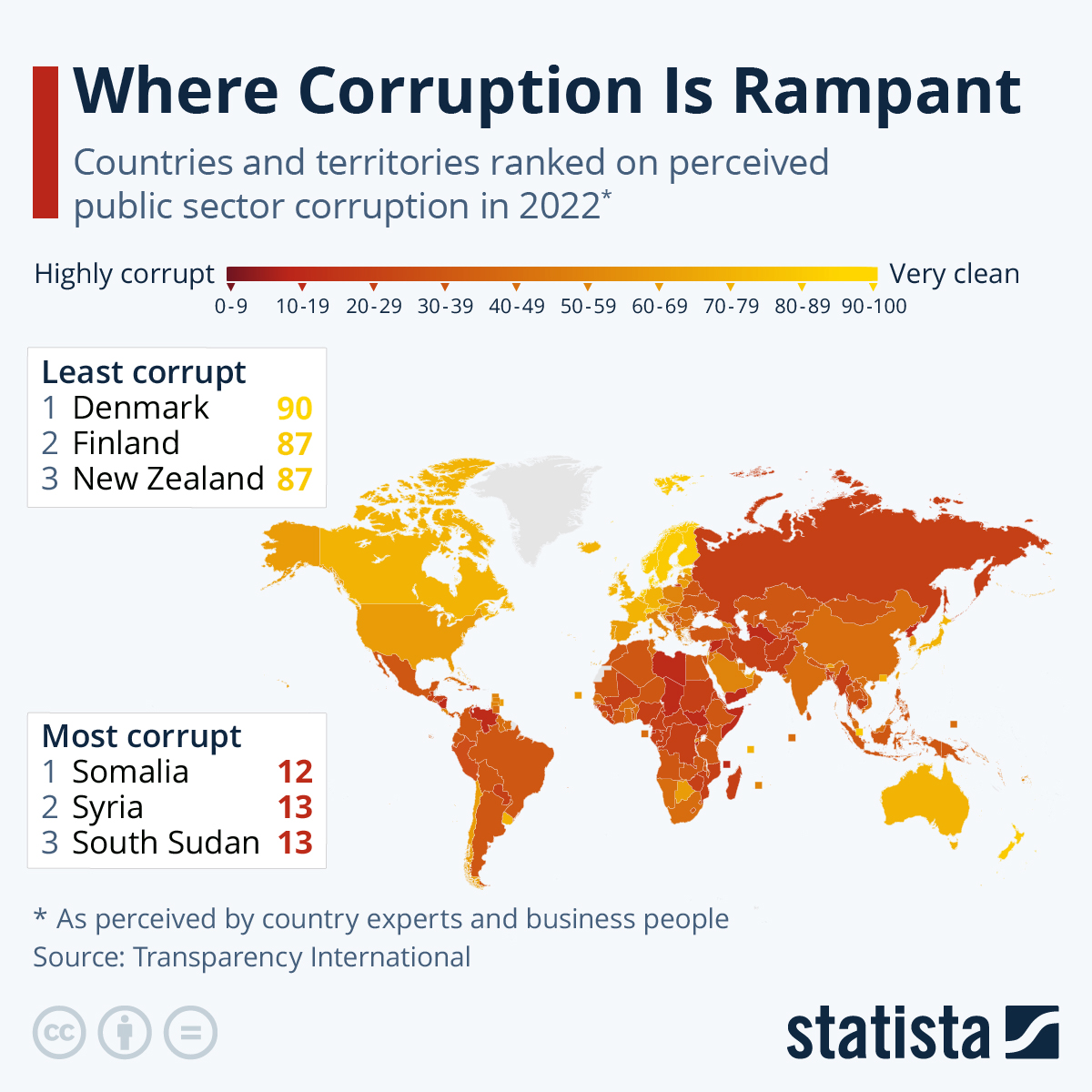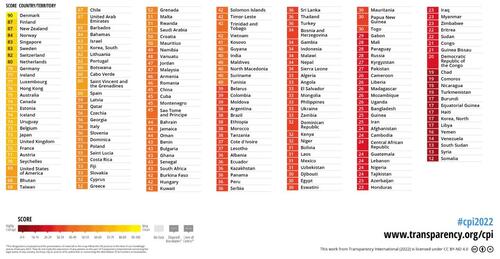
Transparency International has released its 2022 Corruption Perceptions Index which gauges levels of perceived public sector corruption in 180 countries and territories around the world.
As Statista's Martin Armstrong details below, the index scores them on a scale of zero (highly corrupt) to 100 (clean) with the average score just 43 out of 100.
More than two thirds of countries scored lower than 50, as 155 countries have made "no significant progress against corruption over the last decade."
The last edition of the research found that anti-corruption efforts have stalled of late, as many countries used the Covid-19 pandemic "as an excuse to curtail basic freedoms and side-step important checks and balances."
In 2022, the countries with the lowest perceived level of public sector corruption were Denmark, Finland and New Zealand, followed by Norway, Singapore and Sweden.
You will find more infographics at Statista
The opposite end of the index saw Somalia scoring just 12, making it the world's most corruption-stricken country.
Syria and South were close behind with a score of 13, followed by Venezuela and Yemen.
The United States only came in 24th with a score of 69 - a slight increase on last year's score which was the country's lowest since 2012.
Despite the Biden administration establishing corruption as a core national security concern, Transparency International noted last year that the country's relatively low position on the CPI can be explained by the "persistent attacks against free and fair elections, culminating in a violent assault on the U.S. Capitol, and an increasingly opaque campaign finance system."
Although it still scores low, war-torn Ukraine is one of few significant improvers on the CPI, having gained eight points since 2013.
The country has long struggled with systemic abuse of power, but has taken important steps to improve oversight and accountability.
However, Transparency International reports that Russia’s war of aggression has disrupted some of the reform processes and exacerbated corruption risks. Reconstruction and recovery efforts can be drastically undermined by wrongdoers pocketing funds, both during the war and after.
Such a case was discovered in mid-January when investigations exposed war profiteering by the defence and the communities and territories development ministries. The scandal clearly underscores the need for reforms to prevent such violations in the future, from both domestic and global actors.
As foreign aid will play a vital role in rebuilding Ukraine, the international community must support the Ukrainian government in strengthening its national anti-corruption agencies and civil society.
But, remember, the US Treasury Department just reported that it found " no indication that U.S. funds have been misused in Ukraine."
Transparency International has released its 2022 Corruption Perceptions Index which gauges levels of perceived public sector corruption in 180 countries and territories around the world.
As Statista’s Martin Armstrong details below, the index scores them on a scale of zero (highly corrupt) to 100 (clean) with the average score just 43 out of 100.
More than two thirds of countries scored lower than 50, as 155 countries have made “no significant progress against corruption over the last decade.”
The last edition of the research found that anti-corruption efforts have stalled of late, as many countries used the Covid-19 pandemic “as an excuse to curtail basic freedoms and side-step important checks and balances.”
In 2022, the countries with the lowest perceived level of public sector corruption were Denmark, Finland and New Zealand, followed by Norway, Singapore and Sweden.
You will find more infographics at Statista
The opposite end of the index saw Somalia scoring just 12, making it the world’s most corruption-stricken country.
Syria and South were close behind with a score of 13, followed by Venezuela and Yemen.
The United States only came in 24th with a score of 69 – a slight increase on last year’s score which was the country’s lowest since 2012.
Despite the Biden administration establishing corruption as a core national security concern, Transparency International noted last year that the country’s relatively low position on the CPI can be explained by the “persistent attacks against free and fair elections, culminating in a violent assault on the U.S. Capitol, and an increasingly opaque campaign finance system.”
Although it still scores low, war-torn Ukraine is one of few significant improvers on the CPI, having gained eight points since 2013.
The country has long struggled with systemic abuse of power, but has taken important steps to improve oversight and accountability.
However, Transparency International reports that Russia’s war of aggression has disrupted some of the reform processes and exacerbated corruption risks. Reconstruction and recovery efforts can be drastically undermined by wrongdoers pocketing funds, both during the war and after.
Such a case was discovered in mid-January when investigations exposed war profiteering by the defence and the communities and territories development ministries. The scandal clearly underscores the need for reforms to prevent such violations in the future, from both domestic and global actors.
As foreign aid will play a vital role in rebuilding Ukraine, the international community must support the Ukrainian government in strengthening its national anti-corruption agencies and civil society.
But, remember, the US Treasury Department just reported that it found ” no indication that U.S. funds have been misused in Ukraine.”
Loading…








